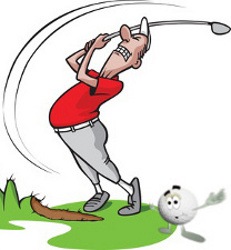
Duff in Golf
Golf is a game of precision and skill, but even the best golfers can have off days where their shots don't go as planned. One term that is commonly used to describe a poorly executed shot in golf is “duff.” A duff is a shot that doesn't get clean contact with the ball, resulting in a weak or mishit shot. Let's dive deeper into this golf term.
- Definition: A duff in golf refers to a poorly struck shot where the clubhead fails to make solid contact with the ball, causing an inaccurate and weak shot.
- Synonyms: Some other terms that are often used interchangeably with duff include flub, mishit, shank, or chunk.
- Causes: Duff shots can happen due to a variety of factors, including incorrect clubface alignment, swinging too hard or too quickly, improper weight transfer, poor balance, lack of focus, or simply a lack of skill or experience.
- Types of Duffs: There are different types of duff shots that golfers may encounter:
- Chunk: This is when the club head hits the ground before making contact with the ball, causing the ball to travel only a short distance.
- Thin Shot: In a thin shot, the clubhead strikes the top half of the ball, resulting in a low trajectory and less distance than intended.
- Shank: A shank occurs when the ball is struck by the hosel (the part of the clubhead connecting the shaft). This often leads to the ball veering sharply to the right (for right-handed golfers).
- Top: When the clubhead hits the top of the ball, the shot tends to roll along the ground instead of gaining height.
- Effects: Duffed shots can have significant impacts on a golfer's game. They can lead to lost distance, poor ball flight, missed fairways or greens, and ultimately result in higher scores or worse, penalty strokes.
- Prevention and Improvement: While duff shots are frustrating, they are a part of the game. However, there are a few steps you can take to minimize duffs:
- Proper setup: Ensure you position the ball correctly in your stance, align your clubface, and maintain a balanced stance.
- Relaxed grip: Avoid gripping the club too tightly, as it can cause tension and hinder fluid swing motion.
- Practice: Regular practice sessions dedicated to improving swing mechanics, consistency, and timing can help reduce duffs over time.
- Take lessons: Seeking guidance from a golf professional can provide valuable insights into correcting swing flaws and enhancing overall technique.
- Attitude and Mindset: It's important to remember that even professional golfers have duff shots. Stay positive, resilient, and focus on learning from your mistakes. Golf is a game of constant improvement.
Understanding the term “duff” in golf allows players to better identify and correct their mistakes, leading to more consistent and enjoyable rounds on the course.





